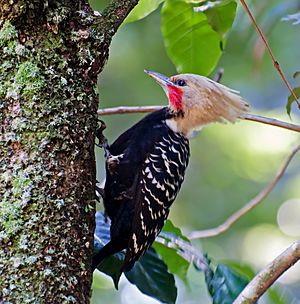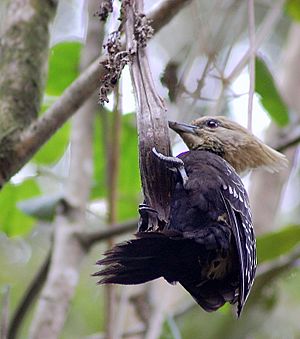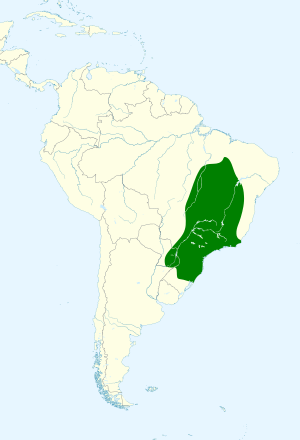Blond-crested woodpecker facts for kids
Quick facts for kids Blond-crested woodpecker |
|
|---|---|
 |
|
| Male in São Paulo, Brazil | |
 |
|
| Female | |
| Conservation status | |
| Scientific classification | |
| Genus: |
Celeus
|
| Species: |
flavescens
|
 |
|
The blond-crested woodpecker (Celeus flavescens) is a type of bird from the woodpecker family. You can find this colorful bird in parts of Argentina, Brazil, and Paraguay.
Contents
About the Blond-crested Woodpecker
Naming and Family Tree
The blond-crested woodpecker got its official name in 1788. A German scientist named Johann Friedrich Gmelin first described it. He gave it the scientific name Picus flavescens. The word flavescens means "golden-yellowish" in Latin. This name fits well with the bird's colors.
Today, this woodpecker is part of a group of 13 species. They all belong to the Celeus family. There are two main types, or subspecies, of the blond-crested woodpecker. One is called C. f. flavescens. The other is C. f. intercedens.
What Does It Look Like?
The blond-crested woodpecker is about 27 to 30 centimeters (11 to 12 inches) long. It weighs between 110 and 165 grams (3.9 to 5.8 ounces). That's about as heavy as a small apple.
Male woodpeckers have a bright red patch on their cheeks. This red color sometimes goes around their eyes. Female woodpeckers have black stripes on their cheeks instead of red.
Both male and female adults have a pale, creamy head. Their long, pointed crest is also light-colored. Their chin and throat are usually yellowish-white. Sometimes, they have black streaks on the side of their neck.
Their upper back is black. The lower back and rump are light yellow or buff-white. Their wing feathers are black with thin white stripes. The tail feathers are black, with white edges on the outer ones. Their lower body is black. Their legs are blue-gray. Young woodpeckers look similar but are not as brightly colored. They also have more black on their face.
What Sounds Do They Make?
This woodpecker has several calls. One main call is a loud "tsew" or "wee." They repeat this sound up to seven times. They also make a series of "wheep" notes. Sometimes, they make an "aggressive 'tttrrr'" sound. Another call is a "raucous 'wícket wícket'." Their drumming sound is soft and short.
Where Does It Live?
The blond-crested woodpecker lives in South America. The C. f. intercedens subspecies lives in east-central Brazil. The other subspecies, C. f. flavescens, lives further south. It can be found in southern Brazil, eastern Paraguay, and Argentina.
These woodpeckers like to live in forests. They can be found inside forests or at their edges. They also live in areas with scattered trees, like savannas. Sometimes, they live in orchards too.
Woodpecker Behavior
Staying in One Place
The blond-crested woodpecker does not migrate. It stays in the same area all year long. This means it is a resident bird.
What Do They Eat?
This woodpecker mostly eats ants and termites. They especially like carpenter ants. They also eat some fruits and berries. They usually look for food in the middle or top parts of trees. But they also search for food on the ground. They find insects by pecking, probing, and hammering. They often feed in pairs or small groups. These woodpeckers help plants by spreading seeds. They also help pollinate flowers.
How Do They Raise Their Young?
Blond-crested woodpeckers breed at different times of the year. In eastern Brazil, they breed from April to June. In Argentina, they breed from October to November. They make their nests inside trees. They dig a hole in the wood. Sometimes, they make a nest in an ant nest that is in a tree. Not much else is known about how they raise their young.
Conservation Status
The blond-crested woodpecker is listed as "Least Concern" by the IUCN. This means it is not currently in danger of extinction. It lives in a large area. However, the total number of these birds is not known. Scientists believe their population might be getting smaller. No major threats have been found for this bird. It is quite common in many places. It also lives in several protected areas.
See also
 In Spanish: Carpintero amarillento para niños
In Spanish: Carpintero amarillento para niños


